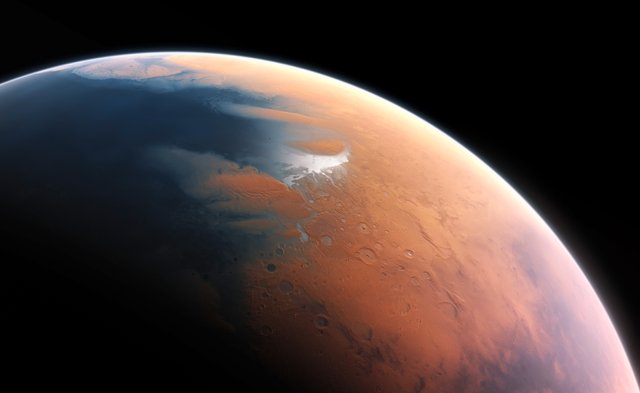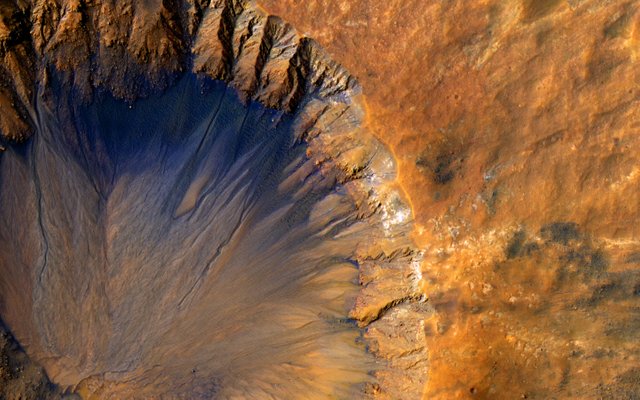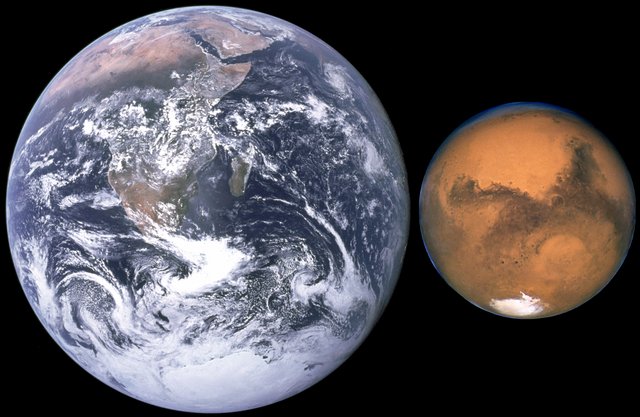Colonization of MARS - Analyzing the science and creating a Colonization Handbook of the next step in Human Evolution
Mars is the most viable planet in our solar system for us to experiment on. The future of humankind is not limited to our planet which can't possibly sustain all of us. Just think of only how much mining and deforestation did to change our environment. What if we could use resources found outside of our planet and we could build a launch platform to venture even further into space?
This is the start of a scientifically backed series, in which I will combine basic physics everyone should know with data extracted from the main science articles on the matter, trying to assemble a Mars Colonization Handbook that should be easy for everyone to read.
Why MARS?
Because of its relatively many similarities to Earth. The Martian day (named sol) is marginally longer than on Earth, by about 39 minutes. It also has a tilt, which makes seasons behave much like on Earth. Mars is smaller than Earth but it has similar landmass surface to the one on Earth. Having a smaller average density and a smaller size, it could be cheaper to orbit satellites than Earth.
Why wasn't it done before?
Because a space program is a very expensive project. It wasn't even supposed to happen if it wasn't for the Cold War and the need of the United States to show its superiority over the Soviet Union. The fact that we went into space and devoted such a huge amount of funds for this, way ahead of its time, it's something that works in our advantage. Now we have the basis of the research and we can push forward. Unfortunately for us, we are living in a world where social problems tend to swamp us and military spending has reached enormous levels, amidst lack of trust between states.
State vs Private space endeavor
The sovereign states space programs cost more and have a very high upkeep cost, because of many organisms and reliance on subcontractors that are also private companies holding a position of monopoly. Add to this the fact that most of the vocal actors in the space discussions are former astronauts - actually congressmen that can divert a lot of funds to the few private lobbyists involved and you have an image of why space research is so expensive. While a governmental space program can also involve the educational system and public education programs in the development of its own programs is a positive idea, when comparing it to the patent claiming, profit driven private companies, but by switching the focus of the state toward acting its role of a regulator, much of the two worlds could be combined.
A private company could focus on very specific tasks, dividing the market into smaller manageable services and systems to develop, own and use for a regulated limited amount of time. Plus, the attractiveness of space for creating worldwide services is unbeatable. To provide internet services from the orbit and cover 100% of the world is surely just possible at a great cost, or is it? By allowing and stimulating the competition we could see prices drop in these kinds of services. And when technology is developed sufficiently as to allow mining operations into space who will have to gain? It will be everyone invested in such a company that will keep the planet green and a steady amount of income from renewable practices.
What about the benefits
First of all let's talk about the inevitability of an extinction event on Earth. I will go in further detail in a future article but as I have calculated there are many types of asteroids that could impact and turn Earth into a light-less cold hell. Some types of asteroid can even be very small but due to their consistence they would not burn sufficiently in our atmosphere to disintegrate. It makes sense to backup our phones, but not our species?
The Economy boost would be enormous. In Robert Zubrin's "The Case for Mars" I read a few years ago, I found out that:
"Another alternative is that Mars could pay for itself by transporting back ideas. Just as the labor shortage prevalent in colonial and 19th century America drove the creation of Yankee Ingenuity's flood of inventions, so the conditions of extreme labor shortage combined with a technological culture and the unacceptability of impractical legislative constraints against innovation will tend to drive Martian ingenuity to produce wave after wave of invention in energy production, automation and robotics, biotechnology, and other areas. These inventions, licensed on Earth, could finance Mars even as they revolutionize and advance terrestrial living standards as forcefully as 19th Century American invention changed Europe and ultimately the rest of the world as well."
Let's say that this would not be enough, what about Space Tourism? It could be a thrilling experience for everyone who can afford it,true it will be exclusive to very rich individuals at first but their money will be invested into making cost affordable services for the others and the prices will soon fall by an order of magnitude at least. This was the case with exotic trips on Earth that were quite exclusive and now are maybe 10 times cheaper than 50 years ago.
Annually, about 1000 people are trying to climb Mount Everest and pay around $30k-$45k for a chance to summit. Most of these money usually come from backers and fundraisers. Imagine that climbing a mountain on Mars or just being part of the sponsor team of that attempt will be a huge PR success. Yes, I am thinking about you, RedBull and GoPro.
There are many other ways in which the economy of both planets would benefit, that were proven before, when the New World was discovered. Exploration, research, mapping, technology, geology, they will all face a tremendous change and an increase in interest.
We have already talked of the science regarding reaching Mars safely in my previous series (1,2,3). Long story short, we are on the brink of having the technology required to get humans there and we are figuring the details. According to our best estimates we could probably get there by 2024.
 Rendering of how Mars would have looked 4 billions years ago, before it lost its atmosphere and subsequently its water. Source: Wikipedia Media Commons
Rendering of how Mars would have looked 4 billions years ago, before it lost its atmosphere and subsequently its water. Source: Wikipedia Media Commons
Future Challenges for a Colony
Trying to establish a martian colony will surely prove a very complex engineering problem.
I will try to analyze the science we have right now or in the near future for any of the following challenges that such a colony could pose:
- Can we make sufficient breathable air in our colony?
- Can we find a source of water on Mars?
- Can we feed the colony remotely?
- Can we protect against radiation?
- Can we survive the extreme martian cold?
- Can we develop a transport system?
- Can we survive micro gravity?
- Can we get sufficient energy for the colony?
- Can we survive the low atmospheric pressure on Mars?
- Can we produce the fuel needed to get back to Earth?
- Can our minds live under the constant stress and solitude?
- Can we be self sufficient there and how long until then?
- Can we thrive on Mars? Could we adapt?
- Can we even think about terraforming?
- Can we ever communicate in real time?Will there be a copy of the internet on Mars?

Sunset on Mars as viewed by Spirit Rover
I will get knee deep in science articles and provide Steem with relevant scientific data on each of the subjects,trying to make a Mars Colonization Handbook. It makes me very happy to create such a guide for you.
Science is a beautiful human endeavor in itself and I want to see more people reading about it and having fun while reading about it. I am trying to attract more people to write about science and unravel some of its mysteries. The rewards will be used in my new secondary project, part of @steemromania, which is promoting education in impoverished areas and offering a way so that people can connect to the world, opening their horizons and a few doors toward a future job, outside of poverty. It's our duty to pull them out because we know better.
Sources:
My general knowledge, fact checked by wikipedia and the internets. I rarely trust myself with numbers.






Congratulations! This post has been chosen as one of the daily Whistle Stops for The STEEM Engine!
You can see your post's place along the track here: The Daily Whistle Stops, Issue # 64 (3/5/18)
The STEEM Engine is an initiative dedicated to promoting meaningful engagement across Steemit. Find out more about us and join us today!
Thanks! I will continue delivering, I have a lot of ideas :)
Just need more time as articles take me even 3 days to document, fact check and write. I am also working so I am finding time to merge everything together...
People are already signing up to move there, for the rest of their lives right? Didn't I read that somewhere?
Anyway, in the near future no one will need to work anymore - unless there's a huge bloody revolution leading to mass extinction, there will be 9 billion people on UBI, with lots of spare time and not enough money to do the things they want to do. So there will be no lack of volunteers.
Mars ONE is that project's name. It's a highly unlikely mission to actually proceed :) but I think I am enlisted or wanted to enlist at some point. You ideas of UBI make me want to double follow you.
Sadly, I don't see widespread UBI until more people start changing their mentalities. UBI is not free money to stay at home. UBI is exactly what it says: Universal Basic Income which should prevent people from starving and having to beg instead of going to school. Nobody should stop working because they are on UBI :)
Yes, I agree, but I forgot to mention, my point is robots and AI will take over all paying jobs in the near future, that's where the revolts come in, if people don't get UBI they will starve and all hell will brake loose. Sure, people will still work, if they choose, like we do, with stuff we love. But no one will pay us for it. :)
Humans will never move to places with unsuitable living conditions just for the fun of it. So all the challenges above are nearly not feasible logically but this is science/technology we're talking about where nothing is impossible. Astro science all the way
Really interesting post my friend. Much love💓💓
We don't have to move there, just like no country moved to the Americas. They were colonized and served as a starting point for new civilizations. And we can do great science there.
Point noted
Great writing. I like it better here.
You're just saying that because it's all green. But Mars can be green too, one day, in the distant future. But for humanity the distant future is just a blink away, on our way to Enceladus and Vasimr drive.
It's interesting, thanks for sharing!
Thanks, I find your drawings nice. Sadly I don't have the gift, but I can model things in 3D :D
Wow this is really amazing life in an entirely different planet! . All what we once thought were fiction are now coming into existence. Science will always keep on advancing
I will be using every subject in that list to also teach something about physics phenomena. This way we startle our brains and still learn something without feeling like learning. I think this is the way to learn.
Yeah I can't fail to agree with you on that. I have found out that things I post and read on steemit have made me very knowledgeable on various stuffs.
amazing post!!!! :D like an alien movie but soon
So travelling to Mars was to show superiority of USA to Soviet Union.What about the cost.?All the way,i love what I read.
No, the Space Program was to show the superiority. Back in the 60's, during the Cold War. If traveling to Mars was made to show superiority we would have already been there :)
👍 @alexdory.All what we still need is great research for human development and I think that the US is still on that.
I think if we start to colonize Mars and have tourist tours, the civilization will already be at a point where we changed our way of thinking. I believe it will be available for most people, not just rich one, at least in a short period of time.
We need to be advanced, as a civilization, to get to Mars, and not just with technology but also in our minds...
Cheers!
Greetings! You've been upvoted by @romaniaball. It's here to support Romanian users on Steemit and the @steemromania community. If you want to support us, feel free to delegate SP to @romaniaball. Help us build up the Romanian community! Join the SteemRomania Discord server! https://discord.gg/Jrg8w6U Salutari! Ați fost votat de @romaniaball. Este aici pentru a sprijini utilizatorii români pe Steemit și comunitatea @ steemromania. Dacă doriți să ne sprijiniți, nu ezitați să delegeți SP la @romaniaball. Ajutați-ne să construim comunitatea românească! Alăturați-vă serverului de discuri SteemRomania! https://discord.gg/Jrg8w6U